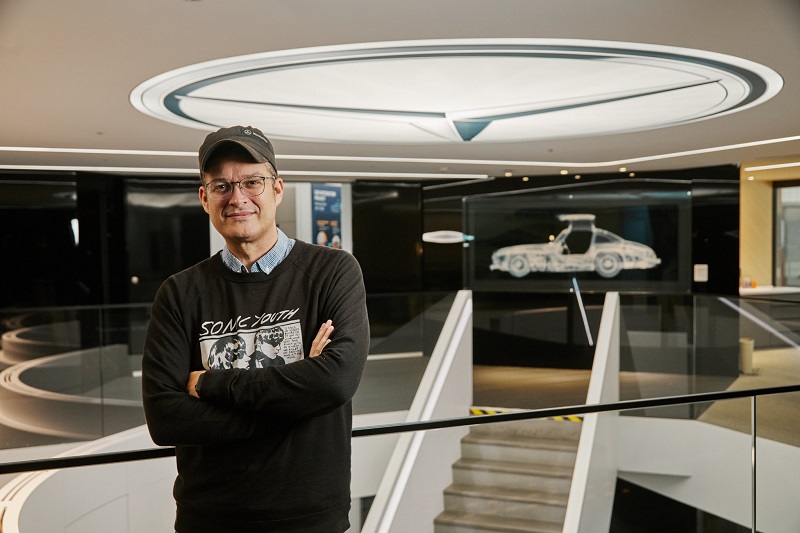Sustainability and digitalisation go hand in hand. That is certain for tech expert Sascha Pallenberg. In the second part of his //next conversation with Markus Sekulla, he goes into depth on the hype topics of artificial intelligence (AI) and blockchain.
 Sascha Pallenberg
Sascha Pallenberg
Hi Sascha, in the first part of our interview we dived into the connection between digitalisation and sustainability. Now I would like to talk to you about two topics that are discussed particularly often when it comes to forward-looking technologies: artificial intelligence and blockchain. My first question is therefore: What role can these two technologies play in the fight against the climate crisis?
There are quite a few developments that combine AI and sustainability. If we look at what most of the top 500 super computers are used for today, weather/climate calculations and the corresponding forecasts are up there. A large number of AIs have been developed for this purpose in order to be able to make precise predictions, which then also show us how the climate is likely to develop in the future. And unfortunately, that looks anything but great at the moment ...
Please let us be concrete with an example ...
Sure! An example for a company who developed a solution would be the German startup gridX from Aachen. They are working on AI-based smart charging stations. That brings us back to the mobility topic from the last part of our interview. There is huge potential for energy savings here. The concept: We have a million electric cars on our roads, and each of them has a battery with 60 kilowatt hours (on average). The maths shows that we have 60 million kilowatt hours of battery storage on our roads. Of course, these can be used for more than just the cars. If you take this a step further, these vehicles could also become part of our power grids. But then there is the question of the perfect time and quantity for charging. Or whether I can feed electricity from my car back into my own house. Such learning and efficiency-enhancing systems are likely to play a major role in the future. In tests with cooperation partner E.ON, gridX has seen efficiency gains of between 20 and 30 percent with AI.
But it's not just startups that have dedicated themselves to increasing emission efficiency. After all, while we individuals consume quite a bit in our homes, the big energy guzzlers are and remain large companies that operate large data centers, for example. Cooling them efficiently and not causing any disadvantages for users is a challenge that Google has tackled with the AI DeepMind. Here, about 40 percent energy are saved.
Here in Taiwan, too, there are many AI systems that enable resource-efficient traffic control, for example: Garbage collection, traffic light systems and public transport are thus constantly adapted to the current situation.
In addition, there is of course also the possibility of using technology to make supply chains or entire sectors of the economy more efficient. Hashtag: blockchain.
Great, that would have been my next question. We at //next think of the blockchain technology as something very future proof and there is a lot of untapped potential. When you read about blockchain in the media, you usually also talk Bitcoin, which many people say is a "climate killer". What's your take on that?
Yes and yes. Let's start with the blockchain: Efficient supply chains will make insane differences. If we have the possibility to map all products in an economy via the blockchain - i.e. all resources and all products that are created from them and many other factors - then other companies will have the possibility (if this data is openly accessible obviously) to see where they can make processes better and more efficient with their products. The CO2 emissions of the entire cycle would then also be identifiable. With this it would be possible to improve the supply chain, save CO2 emissions and thus make the entire value chain more efficient. The important thing here is to make data available transparently and then have it processed by an AI and thus identify potential for efficiency improvements.
Now to the subject of Bitcoin. Indeed, a huge climate killer. Anyone who claims otherwise probably has coins in their wallet and an interest in seeing the price rise again. Leaving aside what energy expenditure goes into mining Bitcoins or transactions in the first place: Today, it is simply a bet on a means of payment of the future, which, however, will not come true in my view. No matter how often Elon Musk tweets about whether or not he'll sell Teslas for Bitcoins.
On the bottom line Bitcoin is an asset like gold. And nobody goes into a bank or a café and puts bars on the table and says, "I'd like a double espresso, please." In addition, a BTC transaction takes a few hours because their blockchain is totally inefficient and there are now far better - and more sustainable - solutions. Ethereum, IOTA, Ada or Cardano are superior to Bitcoin not even by worlds, but by galaxies in terms of efficiency and scalability.
After all, the biggest question is still: Why do we have to spend many millions of megawatts a year putting zeros and ones together, and why don't we just take that energy that goes into Bitcoin mining and transactions and feed our grids with it? But there is a lot of money involved, and it says a lot about our current "bullshit economy." I don't see any sustainability ideas there, no matter how many many self-proclaimed investment advisors on YouTube say that Bitcoin will become the big driver for the energy revolution ...
Thank you, Sascha, for this deep dive on AI and Blockchain. @All, the third part is then about practical tips for technology that we as individuals can quickly implement to live a more sustainable life.
Interview: Markus Sekulla
Most popular